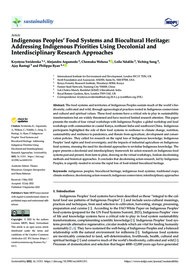The role of biodiversity, traditional knowledge and participatory plant breeding in climate change adaptation in Karst mountain areas in SW China
This is a report of a country case study on the impacts of climate change and local people’s adaptation. The research sites are located in the karst mountainous region in 3 SW China provinces - Guangxi, Guizhou and Yunnan – an area inhabited by 33 ethnic groups of small farmers and the poor, with rich Plant Genetic Resources (PGR) and culture. Climate change is exacerbating already harsh natural conditions and impacting on biodiversity of remote farmers living in extreme poverty, with very limited arable land. Genetic diversity has also suffered from the adoption of high yielding hybrids. Yet traditional varieties, related TK and Participatory Plant Breeding (PPB) for maize and rice are showing real potential for resilience and adaptation
Cite this publication
Available at https://www.iied.org/g03146







